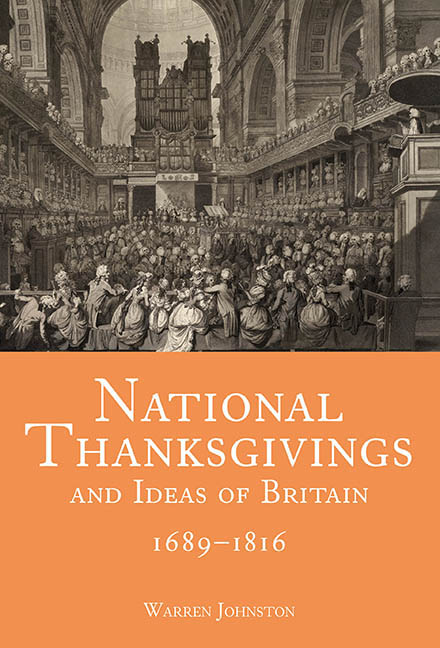Book contents
- Frontmatter
- Dedication
- Contents
- Acknowledgements
- Notes on elements of the text
- List of general thanksgiving days 1689–1816
- Introduction
- 1 Sermons and thanksgiving-day sermons in the long eighteenth century
- 2 Thanksgiving-day sermons – purposes and meanings
- 3 ‘The Palladium of our Safety’ – Providence and Britain
- 4 Political theory and principles
- 5 ‘This Carping Age’ – the politics of unity and discord
- 6 War
- 7 Costs of war and consequences of peace
- 8 Commerce and Empire
- 9 Anglicanism, dissent, anti-Catholicism, and infidelity
- 10 Others and Britons
- Conclusion
- Appendix A Thanksgiving-day preachers’ and sermon details
- Appendix B Denominational breakdown of thanksgiving-day preachers
- Appendix C Main scriptural texts used for thanksgiving-day sermons
- Bibliography of primary sources
- Bibliography of secondary sources
- Index
4 - Political theory and principles
Published online by Cambridge University Press: 02 May 2020
- Frontmatter
- Dedication
- Contents
- Acknowledgements
- Notes on elements of the text
- List of general thanksgiving days 1689–1816
- Introduction
- 1 Sermons and thanksgiving-day sermons in the long eighteenth century
- 2 Thanksgiving-day sermons – purposes and meanings
- 3 ‘The Palladium of our Safety’ – Providence and Britain
- 4 Political theory and principles
- 5 ‘This Carping Age’ – the politics of unity and discord
- 6 War
- 7 Costs of war and consequences of peace
- 8 Commerce and Empire
- 9 Anglicanism, dissent, anti-Catholicism, and infidelity
- 10 Others and Britons
- Conclusion
- Appendix A Thanksgiving-day preachers’ and sermon details
- Appendix B Denominational breakdown of thanksgiving-day preachers
- Appendix C Main scriptural texts used for thanksgiving-day sermons
- Bibliography of primary sources
- Bibliography of secondary sources
- Index
Summary
‘Should what is here published be thought too political for the pulpit, let it be recollected, that scripture politics very well agree with sound doctrine; and, it is presumed, nothing contrary to sound doctrine has here been admitted.’ This justification is found on the opening page of the preface to the published version of John Martin's sermon from the thanksgiving day in November 1798. Martin was the Baptist minister to the Grafton Street meeting in Piccadilly in London, and his discussion of political ideas and themes was not unusual. Topics of a political nature, and with political implications, were regularly delivered from the pulpit, and this is certainly confirmed in the thanksgiving-day sermons from 1689 to 1816. On these occasions, intricately entwined with current circumstances, preachers perceived consideration of a variety of political topics as being within their purview, and they invited people to consider these events as junctures where political contexts and results were important elements of the day's significance. Sermons connected religious themes to political ideologies, as well as to current political debates. This chapter will examine how preachers presented British political principles, while the next chapter will explore their commentary upon political happenings and arguments of the day.
Thanksgiving and political philosophies
The range of political ideas that thanksgiving-day preachers considered was wide, stretching from the very foundations of human society to commentary on current political thought. Ministers explained this as a proper and important element of their religious responsibilities, and of their acknowledgements of the benefits that Britain had, and would continue to, receive. Far from being contrary to thanksgiving messages, political topics were essential to understanding the implications and effects of divine support for human society in general, and for Britain in particular. Some preachers, like John Barr, the rector of Owmby in Lincolnshire, felt it necessary to ‘go back to the Institution of political Society’. Barr's 1746 sermon included a lesson in Lockean ideas regarding the state of nature and the establishment of government, noting that equality in creation meant ‘no one can have any Dominion over another’ until ‘a number of Men have freely consented to quit their natural State of Freedom and Independence by constituting some one or more to have Government of them… [and] agree on some Form under which they are to live’.
- Type
- Chapter
- Information
- National Thanksgivings and Ideas of Britain, 1689–1816 , pp. 91 - 114Publisher: Boydell & BrewerPrint publication year: 2020



